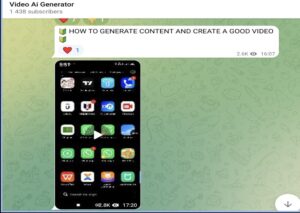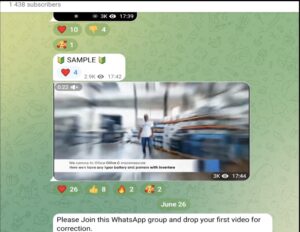By Muslim Muhammad Yusuf
The rise of AI-Fueled deception in the health sector is raising new levels of concern. Across Nigeria’s social media and messaging platforms, a new wave of health supplement advertisements is emerging. Unlike traditional adverts featuring real customers, many of these ads now use AI-generated voices, faces, and testimonials to convince unsuspecting buyers.
These AI-generated testimonial videos are produced with avatars, voiceovers and scripts, making it hard for viewers to tell they are fake. Vendors use them to sell unverified supplements and fake drugs, targeting vulnerable audiences through Facebook ads.
While some Nigerians use AI-generated videos for good purposes, this trend risks normalising fake endorsements and misleading consumers.
There are a series of sponsored ads on Facebook, each promoting what appeared to be legitimate health supplements. But after digging deeper, it became evident that these were AI-generated testimonials. One particular ad that may get anyone’s attention, that this reporter came across, was a video claiming a revolutionary cure for Hepatitis B.
Hepatitis B remains a serious public health crisis in Nigeria. According to recent surveys, the national prevalence of chronic hepatitis B virus (HBV) is about 8.1% among adults, with roughly 20 million Nigerians living with HBV. Treatment options do exist, but many Nigerians struggle to access them.
The approved medications, such as tenofovir and lamivudine, are used to suppress the virus and prevent liver damage, but do not cure HBV entirely. Barriers to treatment include high costs of diagnosis, making its patients look for cheaper alternatives like these ‘online vendors’.
In the comments section, numerous users were found expressing their belief in the product and asking for the vendor’s contact details. In one video, a synthetic avatar claimed to have been cured from Hepatitis B within 7 days, and the comments section was filled with people eager to learn more and even share their own supposed success stories.
What stood out was the invitation in the comments for people to pay a fee around 1,000-5,000 Naira to join a training group on how to create similar AI-generated videos.
The Making of These AI-generated Videos
This reporter joined one such group and paid the fee. There, he discovered a network of online marketers being trained to create AI-driven testimonial videos for deceptive product promotions.
In the Telegram group, with over 1,000 subscribers, the instructor guides participants through the process of generating realistic avatars, scripting and using AI voiceover tools to mimic local accents before later directing members to join a Whatsapp community for easy engagements.

In the 5 minutes and 51 seconds video, participants were encouraged to target Facebook and WhatsApp audiences, particularly Nigerians above the age of 40, who are seen as more trusting and more likely to buy health supplements.
In one of the videos shared in the group, the Coach demonstrated how to make a testimonial video that appeared to feature a middle-aged woman giving emotional thanks for being cured of diabetes. Within minutes, an entirely fake but convincing video was produced, complete with voice, facial expressions, and background music.
When this reporter privately asked one of the group members if the drugs they promoted were verified by NAFDAC, he replied casually: “Don’t worry about that. The goal is to make the product look real enough to sell.”

On Facebook, several of these ads were promoted using paid campaigns. The algorithms pushed them into the feeds of people searching for herbal cure, diabetes remedy or Hepatitis treatment.
Despite Facebook’s policy against health misinformation, it still allows these videos to thrive. Some pages had been running for months, boasting thousands of engagements and positive comments from unsuspecting users.
The process
To better understand how easy it is to make these videos, this reporter subscribed to Google’s paid AI tier and tried the tools. In Nigeria the Google AI Pro plan which unlocks higher access to Gemini 2.5 Pro and limited access to the Veo 3 video generator is marketed at about 28,500 Naira per month.
Gemini’s Veo 3 is explicitly designed to produce short, high-quality video outputs with native audio. Users can generate as many clips as they wish within their subscription period, then stitch them together using simple video editing tools like CapCut, InShot, or Adobe Premiere Rush to create longer adverts.
To test the process, this reporter generated a one-minute testimonial-style video using a series of short clips created through Veo 3. The AI avatars spoke in clear Nigerian accents and delivered lines that sounded emotionally convincing. Without close scrutiny, it would be nearly impossible for an average viewer to detect that the video was synthetic.
This simple process allows scammers to mass-produce deceptive videos at minimal cost, attract unsuspecting buyers, leaving them with fake or harmful products.
What the law says
When it comes to regulating digital content in Nigeria, there are several laws and bodies involved, but exactly who is responsible for what is often murky.
Cybercrimes act (Prohibition, Prevention, etc.) as amended in 2024, criminalises the spread of “false or misleading information” online. Offenders may face up to 2 years’ imprisonment.
It also holds social media groups administrators legally responsible if they knowingly allow harmful or unlawful content to be shared in their groups without moderation or intervention. These among other provisions could theoretically apply to the creation or sharing of AI-generated testimonials that mislead people into buying fraudulent or unverified medicines.
The Nigeria Communications Commission (NCC) is a telecommunications regulator which oversees telecom providers, service providers, internet infrastructure, and issues policies and guidelines regarding telecommunications operations. However, it has repeatedly stated that its legal mandate does not cover regulating the content posted on social media platforms.
During a meeting with civil society groups, the NCC affirmed that while it can play roles in protecting users, for instance, via digital safety, child protection online, incident response teams or in handling cybersecurity threats, the actual content of social media is not strictly under NCC’s remit.
However, the National Information Technology Development Agency (NITDA) also plays a crucial role in this space, particularly through its mandate on data protection and digital governance.
Under the Nigeria Data Protection Act (NDPA) 2023, NITDA is empowered to ensure that personal data shared, collected, or processed online is done lawfully and transparently.
Expert warns public to be Cautious
Digital safety analysts say this growing ecosystem of AI-generated misinformation poses a serious risk to the public, as desperate consumers may abandon prescribed treatments for unverified alternatives.
Digital expert Ibrahim Zubairu Malimiromba said the growing trend of AI-generated testimonial videos calls for greater public vigilance, especially among Nigerians who rely heavily on social media for health information.
Zubairu explained that many users are unaware of how easily such videos can be produced, making them quick to trust what they see online.
“People assume that if a face is talking, it must be real. But with AI tools, you can generate a talking avatar, clone a voice, and create a convincing testimonial in minutes, all without a real person ever being involved.”
However, he noted that there are technical clues that can help users identify AI-generated content. “If you pay close attention, you’ll notice that some of these avatars blink unnaturally, their lips don’t always sync perfectly with the words, or their facial expressions remain stiff.” Zubairu said.
He also urged the Nigerian Communications Commission (NCC) and consumer protection agencies to launch public awareness campaigns on how to identify AI-driven misinformation.
Regulators Struggle to Catch Up
The Advertising Regulatory Council of Nigeria (ARCON), the body responsible for regulating advertising practices in the country, is also being drawn into the debate over how to handle deceptive AI-generated marketing.
Under the ARCON Act of 2022, all advertising materials published or distributed in Nigeria are required to be vetted and approved by the Council before being made public. The law also empowers ARCON to sanction individuals or organisations that disseminate unverified or misleading advertisements, particularly those relating to health, safety, or public interest.
However, with the rise of AI-generated content, enforcing these provisions has become more complex. Most of the deceptive videos circulating online are created and distributed digitally, often through foreign-based platforms that operate outside ARCON’s direct jurisdiction.
Despite several efforts to obtain official comments, none of the relevant regulatory agencies responded to inquiries on the issue. Text messages, phone calls, and emails sent to the Federal Competition and Consumer Protection Commission (FCCPC), the Advertising Regulatory Council of Nigeria (ARCON), and the National Information Technology Development Agency (NITDA) were not answered as of the time of filing this report.
The purpose of the inquiry was to understand what specific measures these agencies are taking to regulate or sanction the use of AI-generated content that may cause harm to the public.
However, a senior source at ARCON, who is not authorised to speak publicly, told this reporter that the council is aware of the growing challenge and is considering new measures to adapt its regulations to the AI era.
“We are monitoring developments in AI advertising closely. Our goal is to ensure that no content, whether human-made or machine-generated, misleads the Nigerian public or violates the vetting standards,” the source said.
This report was produced with support from the Centre for Journalism Innovation and Development (CJID) and Luminate.


